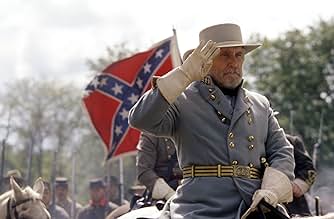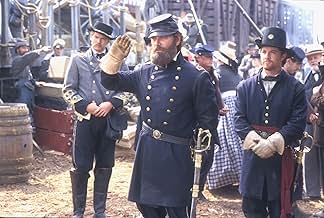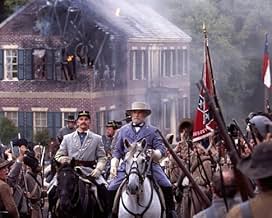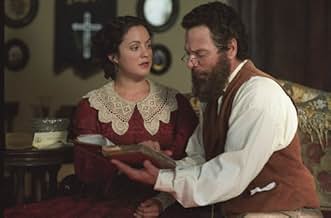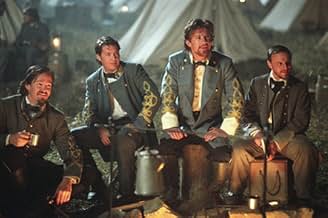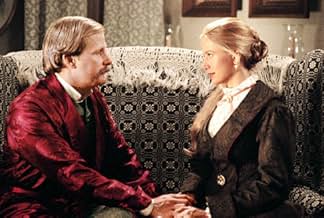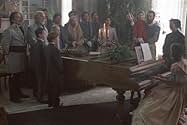The rise and fall of confederate general Thomas "Stonewall" Jackson, as he meets with military success against the Union from 1861 to 1863, when he is accidentally killed by his own soldiers... Read allThe rise and fall of confederate general Thomas "Stonewall" Jackson, as he meets with military success against the Union from 1861 to 1863, when he is accidentally killed by his own soldiers.The rise and fall of confederate general Thomas "Stonewall" Jackson, as he meets with military success against the Union from 1861 to 1863, when he is accidentally killed by his own soldiers.
- Awards
- 1 win & 4 nominations total
- Gen. James Kemper
- (as Royce Applegate)
- Confederate General
- (as Robert C. Byrd)
- Director
- Writers
- All cast & crew
- Production, box office & more at IMDbPro
Featured reviews
Yep, that's just what you might believe. If you took history from this film.
Gods and Generals is a confused, heavily pro-Confederate, train wreck. It attempts to span two years of the war though the perspective of General Thomas "Stonewall" Jackson, arguably one of the most brilliant field commanders West Point has ever produced. Like it's antecedent Gettysburg it is of epic length except that Gettysburg actually made sense. This film is all over the place. Focuses on non-pivotal battles and is bloated with nonsensical dialog and close ups of men talking to themselves in archaic,sanctimonious, soliloquies. There are no issues, there are no cassus belli,no internal conflicts, there is only a clumsy even bizarre celebration of the confederacy; depicted as an embattled yet righteous society defending their way of life against their tyrannical northern overlords. There is one mention of Fort Sumter, a passing nod or two to slavery, and the rest is the Lee/Jackson traveling show. Overall a sloppy production which screams lousy direction and lack of focus. I felt the book told the story of Jackson in much more coherent style than this mess.
To it's credit, it does have very graphic and disturbing battle scenes where both sides are, at times, honored and portrayed with equanimity.
However, G&G, like Gettysburg (a MUCH better directed film), had potential to evenly instruct and entertain. That's where the similarities between the two films ends Gods and generals is a ponderous, rambling, confusing, tribute to the CSA. Aside from it's endless length it jumps around way too much, lacks proper character development and historical veracity, which is far too extensive to get into for the purposes of a review. I will say that Stephen Lang was magnificent as Jackson, but I wasn't terribly impressed with Robert Duvall as Lee. It is no wonder it bombed at the box office. It's just not very watchable, at least not in one sitting. It might be of interest to those, like myself, who are interested in civil war films. This one is a grave disappointment.
The reverence shown to Generals Jackson and Lee is usually reserved for biblical figures. It made me wonder if "Gods and Generals" captures the way people of that time really spoke?
Maybe formal address was more common in the 1860's, but just about everything anyone says in the first hour and a half is a speech. Before the brilliantly staged Battle of Fredericksburg, Jeff Daniels even recites an ancient poem, "The Crossing of the Rubicon".
I'm sure the dialogue has been shaped from historic records and especially letters, but people don't necessarily speak the way they write; some of the exchanges between husbands and wives, and mothers and sons in this film are bizarre. The frequent appearances of John Wilkes Booth ever ready with a Shakespearean soliloquy add to the theatricality.
Some may object to a comparison with "Gone with the Wind'. However it has far more natural speech patterns than "Gods and Generals" and in 1939, when it was released, there were still some thousands of veterans of the war still alive, albeit elderly.
Heightening the dolefulness of "Gods and Generals" is the score. Other than source music from bands and soldiers singing, pathos informs nearly every theme whether for an intimate interior or a horizon-wide battle. To be fair, the theme for the surprise attack at Chancellorsville, "VMI Will Be Heard From Today", shows how the rest of the score could have been coloured differently.
Possibly the filmmakers didn't want to glorify war by building the score around the stirring anthems and songs of the Civil War, but it's a classic example of how music can shape the mood of a film.
For a while it seemed that slavery was receiving a pass, but towards the end, Jeff Daniel's Joshua Chamberlain puts it into context.
"Gods and Generals" does too much. Surely John Wilkes could have been saved for another movie. However the look of the film is amazing. We are transported to those battlefields; each one different, although we are spared what a blast of grapeshot would actually do to a human body.
In the end, those authentic looking re-creations of suicidal advances and troops firing point blank volleys into each other can only leave the impression that it was an era that produced remarkably brave soldiers.
Regarding the lack of political correctness, which in my opinion is our modern version of hypocrisy (we can do anything we want as long as we call it by another name) I would like to point out that this is an attempt at a historical movie and that the Civil War was NOT fought to free the slaves, nor were many people in the North comfortable with the concept of a franchised Negro. And some slaves in the South were relatively well treated by their owners, not that they probably didn't want freedom, but they didn't particularly wish their masters ill. The system was set up so that everyone involved, slaves and masters, had something to lose by destroying the status quo, and that's a very difficult thing for people to do. It's easy for us now to say 'they should have freed the slaves' but if you knew that to free your slaves would beggar your children, would you be able to do it?
As with Gettysburg, the battle scenes were impressive and awe-inspiring. And they made the strategy and tactics clear to the viewer which is a monumental achievement, not to mention showing the pure courage on both sides, going to probably death or dismemberment without flinching. I would have liked more about the Northern command struggles to balance the picture but I can see how tempting it was to show the Southern victories to balance the horrible defeat at Gettysburg -- and this picture is meant to be one of a trilogy. I can only hope that word of mouth defeats the critics and gets this movie the audience it deserves.
What I liked about the movie: I thought Lang did an excellent job portraying Jackson. I was deeply moved by his final scene in the film.
The attention to detail was good; overall it was historically accurate--with some exceptions.
The costumes looked good.
I appreciated the show of how Christianity influenced many in the Civil War, such as Jackson and Lee.
I liked the fact that many from Gettysburg reprised their roles in this film, although there were some who couldn't, which was a little disappointing.
What I didn't like or wished was better about the movie: The fake beards were more than obvious in this film, with the exception of Jackson's and Lee's, but this is relatively minor to the overall film.
I thought, with maybe the exception of the Fredericksburg battle, the depiction of the battle scenes were not nearly as well done as in Gettysburg; but to be fair, there were more battles to cover in this film. Gettysburg only had one, meaning more time could be given to the details of the battle.
The battle of Antietam was not in the movie at all, not even mentioned, which is very disappointing given its significance and effects.
Some of the CGI is poorly done (i.e., very obvious), but, again, this is a small part of the movie and in my opinion neither makes nor breaks it.
Some of the speeches were a bit stiff and seemed contrived, particularly Chamberlain's speech before the battle of Fredricksburg.
Not enough time was given to developing the characters of Lee, Chamberlain, and Hancock, all of whom are important in the novel. In fact, in contrast to the film, the novel gives most time to Lee, not Jackson. To be fair, however, novels usually are better than their film counterparts given the constraints of time.
My thoughts on some of the common complaints about the movie: Some complain there wasn't enough realism as to the carnage of war. To that I say there was enough to get the point across, and for myself, it is refreshing from time to time to see a movie that doesn't rely too heavily on blood and guts. This is not meant to be a blood and guts movie. The novel is even less bloody. Anyone who wants to see a blood and guts war movie should buy or rent Saving Private Ryan, Full Metal Jacket, Hamburger Hill, the Patriot, Braveheart, etc.
Others complain that there were too many poetic speeches. Indeed there were many speeches, but that was also true of Gettysburg, which most view as a good movie. I didn't mind the speeches so much other than they sometimes truncated the character in such a way that the audience fails to see their visceral humanity. As stated above, the only speech I thought was a bit over the top was Chamberlain's before the battle of Fredricksburg. It seemed forced, showy, and odd that the whole regiment would stand motionless and quiet for so long to hear him go on and on. Clearly it was intended to be a poignant moment showing historical parallels between the American Civil War and Roman history. But the whole scene ends up feeling staged and apathetic.
Others complain about the strong emphasis on religion. As stated above, I found this emphasis refreshing, for certainly Jackson and Lee were very devout Christian men. Christianity was a part of the ethos of this country at that time and affected many in both north and south.
Still others complain about the pro-southern perspective being so strong. While I admit there is an imbalance between the northern and southern perspectives, which clearly favors the southern view, I also think this only stands to reason, since the overall focus of the film is clearly on Jackson, a southerner. And given the fact that many other movies often underplay the southern perspective (i.e., it was fought over State's rights) or ignore it altogether, some will find this movie's emphasis a refreshing change. On the other hand, the clear downplay of the role and effect of slavery in this film will no doubt trouble many Americans.
Finally, others complain that the movie is too long. But I find this to be a misnomer. What most really mean by this is that the movie is not entertaining enough to justify such a length. This is not the first long film in cinematic history. Other films were very long and yet praised as wonderful (Terms of Endearment, Dances With Wolves, Gone with the Wind, Braveheart, Lord of the Rings, etc.). The real issue here, I believe, is that this movie for many is too "slow" or "mundane" in their estimation. This, I think, is a result of our becoming so accustomed to roller coaster rides at the movies. If it isn't constantly exciting or humorous or action-packed, it needs to be short. I suppose that in a TV age wherein we are accustom to pure entertainment compacted into ten-minute blocks of time separated by pithy, entertaining commercials, this complaint ought not surprise us, given the historical orientation of this film. But I think such a complaint is evidence of a deeper cultural problem, which should concern us all.
My opinion who will like this movie: many Historians, Teachers, and Homeschooling parents; most southerners; Civil War reenactors; many Christians.
My opinion who will not like this movie: Most northerners, most African Americans, many Liberals, most in Hollywood.
My opinion on how the movie will fare: It will likely not last long in the theaters. Most critics will hate it. It will come out on DVD/Home video sooner than most movies. It will likely not rake in as much money as it cost to make. However, I hope to be proven wrong here. Though not without flaws, I believe it is worth seeing and discussing.
I remember reading about the Director's Cut on the old IMDb forums, they said the theater version left major important parts. Add those back in, and it clicks.
With the missing parts in, it's almost as good as Gettysburg, and Stephen Lang's "Sappy Stonewall" is much less irritating. In the theater we were counting the minutes until the next cry, and coughing to wake up the snoring history buffs all around us.
Ps I miss those forums. For things like this alone, they were gold.
Did you know
- TriviaSome scenes were filmed on Robert Duvall's estate in Virginia, which was the site of some Civil War skirmishes.
- GoofsRobert Edward Lee and Thomas Jonathan Jackson are shown wearing full beards at the very start of the Civil War, but they did not look like this until sometime later. Lee had dark hair going gray and wore a drooping mustache of the type favored by army officers in the 1850s. He grew his well known beard while serving as Jefferson Davis's military advisor. Jackson was clean shaven and grew a beard later out of his well known disinterest in personal grooming and appearance.
- Quotes
Joshua Lawrence Chamberlain: All these thousands of men. Many of them not much more than boys. Each one of them some mother's son, some sister's brother, some daughter's father. Each one of them a whole person loved and cherished in some home far away. Many of them will never return. An army is power. Its entire purpose is to coerce others. This power can not be used carelessly or recklessly. This power can do great harm. We have seen more suffering than any man should ever see, and if there is going to be an end to it, it must be an end that justifies the cost. Now, somewhere out there is the Confederate army. They claim they are fighting for their independence, for their freedom. Now, I can not question their integrity. I believe they are wrong but I can not question it. But I do question a system that defends its own freedom while it denies it to an entire race of men. I will admit it, Tom. War is a scourge, but so is slavery. It is the systematic coercion of one group of men over another. It has been around since the book of Genesis. It exists in every corner of the world, but that is no excuse for us to tolerate it here when we find it right infront of our very eyes in our own country. As God as my witness, there is no one I hold in my heart dearer than you. But if your life, or mine,is part of the price to end this curse and free the Negro, then let God's work be done.
- Crazy creditsNo reenactors were credited individualy, rather there was general thank you to all the reenactors who participated in the filming.
- Alternate versionsThe Director's Cut of the film includes additional action scenes from the Battle of Antietam. The battle scenes are shown from the perspectives of Jackson and Chamberlain, and mostly focus on the fighting in Miller's Cornfield which was a major deciding point of the battle.
- ConnectionsFeatured in Bob Dylan: Cross the Green Mountain (2003)
- How long is Gods and Generals?Powered by Alexa
Details
Box office
- Budget
- $56,000,000 (estimated)
- Gross US & Canada
- $12,882,934
- Opening weekend US & Canada
- $4,675,246
- Feb 23, 2003
- Gross worldwide
- $12,923,936
- Runtime3 hours 39 minutes
- Color
- Sound mix
- Aspect ratio
- 2.39 : 1
Contribute to this page








